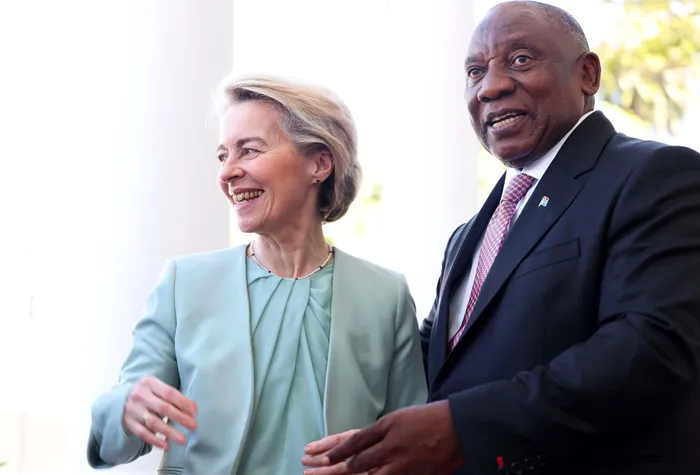Cosatu welcomes R229bn European Union’s Global Gateway Investment Package for SA

File photo of President Cyril Ramaphosa receives the President of the European Commission, Dr Ursula von der Leyen at Tuynhuys in Cape Town.
Image: GCIS
President Cyril Ramaphosa and European Commission President Ursula von der Leyen on Friday announced the European Union’s Global Gateway Investment Package for South Africa to the value of €11.5 billion (R229 billion).
This is a positive boost to our economy, jobs, local businesses, infrastructure, including energy. In simple terms this injection is equivalent to 10% of government’s annual budget.
This is a welcome injection of liquidity into a struggling economy that has been stuck at 1% growth per annum since 2008 and battling to attract the domestic and foreign investments needed to reach the 3% growth rate needed to create jobs and tackle our dangerously high unemployment rate of 42.9%.
The package commits to raising European investments in South Africa with approximately R173 billion in a Just Energy Transition, including allocation for beneficiating raw materials, critical and other minerals locally. This has been a long-standing call of Cosatu and government. It will help sustain and create local industries and value chains and badly needed decent jobs. It will be a boon to a stagnant mining industry.
Investments will include green hydrogen, a priority growth sector that will help unlock local industries. Similarly, investments earmarked for renewable energy, including solar and wind power will help reduce our carbon footprint.
These are important to reinforcing South Africa’s strategic energy mix and reducing generation costs and the price of electricity. They are also critical to helping local manufacturing and other export sectors remain competitive in the European market as it introduces the carbon tax on imports for its consumers.
The package has earmarked R24 billion investments in the Just Component of the Energy Transition. This includes specific commitments to supporting the reskilling of at-risk workers and employment creation for affected communities. It also provides for climate mitigation and adaption investments, including water security, climate resilient infrastructure and sustainable land management as well as research support for green industries and jobs.
Support will be earmarked for green municipal infrastructure, expanding access to clean water and more efficient waste management. With most municipalities losing at least a third of their water to infrastructure leaks in one of the world’s top thirty water scarce countries, this will be an important intervention towards helping ensure all communities, farms and industries have reliable and affordable access to clean water.
All of these are fundamental for communities racked by the effects of decades of pollution by industry in pursuit of profit at the expense of the health and lives of workers, their families and host communities.
R20 billion has been committed for investments to boost transport corridors, ports and rail helping to unlock export industries, in particular mining, agriculture and manufacturing. This will be critical to securing and creating new jobs in these economic sectors. Improved freight and passenger rail and transport will boost the competitiveness of South African exports and reduce the costs of getting to work for workers.
Allocations to improve digital infrastructure, including broadband, data systems and access will be important for students accessing study materials, the unemployed looking for work, workers accessing services and SMMEs seeking customers.
The package commits to R6 billion for expanding South Africa’s pharmaceutical value chain, including the local manufacturing of medicines and related products, partnerships with regulatory authorities, collaborative research, training and capacity building in biotechnology, investments in pharmaceutical infrastructure and its roll-out.
This will not only help to nurture a priority local industry with massive potential but also sustain these value chains and create badly needed new jobs. Massive work has already been done to grow this sector over the years. What is needed are not only investments but also securing market access for its exports, particularly across Africa.
This is key to ensuring South Africa, the region and the continent’s self-reliance and avoiding a dependence on medicines from other countries. The dangers of this dependency were seen during the Covid-19 global pandemic when Africa had to wait for the industrialised world to satisfy their domestic needs before the continent could have access to life saving vaccines. This exposed millions to risk of infection and death and the economy to prolonged risks.
These investments will be invaluable jolt to local jobs and communities, businesses and value chains. They will boost our energy generation capacity, reduce carbon emissions and expand critical economic infrastructure.
Whilst welcoming this progressive announcement by the European Commission and South African government, it is critical that these financial commitments be in the form of investments and grants, not loans.
South Africa needs to manage its debt trajectory very carefully and avoid further indebtedness, in particular foreign currency denominated debt that threatens to place us in a dangerous debt trap.
Foreign currency denominated debt needs to be particularly tightly managed given the continual appreciation of the Euro and other currencies against the Rand and political conditions lenders may attach. We cannot afford to flirt with a debt trap, let alone one that will put South Africa’s sovereignty and constitutionally sanctioned transformation journey at risk.
It is equally critical that the relevant government departments, municipalities and State-Owned Enterprises, vigilantly ensure that these funds are used to capacitate Eskom, Transnet, Metro Rail and other key state-owned enterprises (SOEs) and municipalities.
They need to be targeted to support local jobs, communities, businesses (in particular manufacturing) and value chains. They should not be used to import jobs and materials when unemployment is so high and the economy is in desperate need of stimulus.
This Investment Package is a positive vote of confidence in South Africa as the leading industrial economy in the African continent and a strategic partner for the European Union.
It is a welcome boost for the African National Congress led government’s efforts to capacitate the state and its SOEs, stimulate economic growth and create jobs.
It is a progressive endorsement of South Africa in a year when we have been subject to endless baseless attacks on social media and other platforms by political vandals at home and abroad.

Cosatu President Zingiswa Losi
Image: Independent Newspapers
Cosatu President Zingiswa Losi
*** The views expressed here do not necessarily represent those of Independent Media or IOL.
BUSINESS REPORT